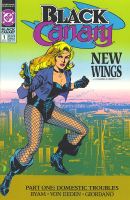 Black Canary (New Wings)
Black Canary (New Wings)
 Black Canary (New Wings)
Black Canary (New Wings)
(1991-1992 - four issues, DC Comics)
Script: Sarah E. Byam. Layouts: Trevor Von Eden. Art: Dick Giordano.
Black Canary was another one of those characters forever lurking around the fringes of the DCU. As far back as the 1940s she actually had her own feature (in the pages of Flash Comics. In the 1960s, she was paired with Green Arrow for one of comicdoms most tumultuous romances, and she appeared either in her own back up strips, or paired with Green Arrow (also in back up strips) off and on through the ensuing years. But she didn't get her own, solo magazine until this mini-series.
By this point, Black Canary had lost her sonic scream, so she's basically just your standard athletic/fighter type super hero. The story has Black Canary befriending an Asian-American talk radio host who's aroused the ire of local drug lords with his "take back the streets" mentality. Said drug lords are hooked up with white supremecists and have political ties to the state government, making for a dangerous opposition.
Ironically, the biggest weakness with this mini-series (sub-titled: New Wings) is the plot itself which, I'll admit, is occasionally a bit muddled, where it wasn't always clear who was working for whom. At the same time, that may simply be a problem with a first reading and, a second time through, knowing where it's all headed, it might hold together better. As well, the story seems like it's going to be edgier, and more political, than it ultimately is. Inner city decay, racism, political corruption. All that's there but, at the end of the day, it really just seems like any old "hero battles drug smugglers" story, where the climactic drug bust seems a let down given the bigger issues raised and then ignored.
But if the plotting is a bit uneven, writer Sarah Byam's ear for dialogue and her feel for characters is decidedly more sure. The scenes generally read well. What's more, she does something all too rare in comics: she manages to create a believable relationship, with clever badinage, developing between Black Canary and the radio host, Gan Nguyen. Early on, Green Arrow makes a cameo -- portrayed in a particularly infantile and obnoxious mode -- presumably to provide a wedge between him and Black Canary, to set things up for the almost romance that develops between Canary and Gan. I say almost, because Byam obviously wasn't given free rein to break up the long standing relationship between BC and GA (though they later did break up). But it's a mark of her handling of the new relationship that the reader can easily want a romance to develop, forgetting there's GA waiting at home. There's also a reasonable sophistication to the talky scenes...a sense this is trying to be an adult story (without straying obviously into "mature readers" territory).
The art by Trevor Von Eden and Dick Giordano is, as you'd expect from Von Eden, dynamic and eclectic. Though Von Eden could get a bit rough with his pencil work at times, so Giordano maybe smooths it out a bit (in fact, Giordano is credited as the "artist" with Von Eden merely providing "layouts" -- though it still looks an awful like Von EEden's stuff). The fact that Von Eden drew an earlier Green Arrow mini-series adds a touch of uniformity to the proceedings. I do quibble a bit with the colours, which can be a bit bright and harsh. As well -- caught in that middle period between old, monotone coloured comics, and the computer assisted multi-hued comics of today -- colourists like Julie Lacquement often experimented with off beat and eclectic colour choices. But the result can be kind of willy nilly -- like a scene where some ostensibly white bigots...are given dark skins!
In an accompanying editorial, editor Mike Gold is quick to herald this as almost revolutionary -- a female lead in a medium where comics with female leads are rare! And sure enough, although this led to a monthly Black Canary series...it only lasted a year. Gold is quick to present himself as a champion of female heroes, and laying the blame for the lack of success of heroines (by inference) at the feet of sexist readers. But what he fails to acknowledge is that many female-hero comics haven't been that good -- and, indeed, even most male characters created in recent years have limited shelf lives (consider: most of the titles on the stand today...are the same ones that have been on the stands for decades!) But it's also ironic that Gold brags about getting rid of Black Canary's "lame" sonic scream...when surely things like that are what hurt characters (male and female). Without her scream (a fairely unusual ability in comicdom) there's very little about the character to distinguish her from every other also ran hero on the stands. Perhaps most ironically, in the letters pages writer after writer comments on how good it is too see Black Canary done right, after (what they felt) was the rather shabby, dismissive treatment she was receiving in Green Arrow's then on-going series -- a series which Gold edited.
After a first reading, there's not too much that makes this a "must" read. But with some intelligent handling of characters and dialogue, a brisk pace, and dynamic art, it's certainly a good read.